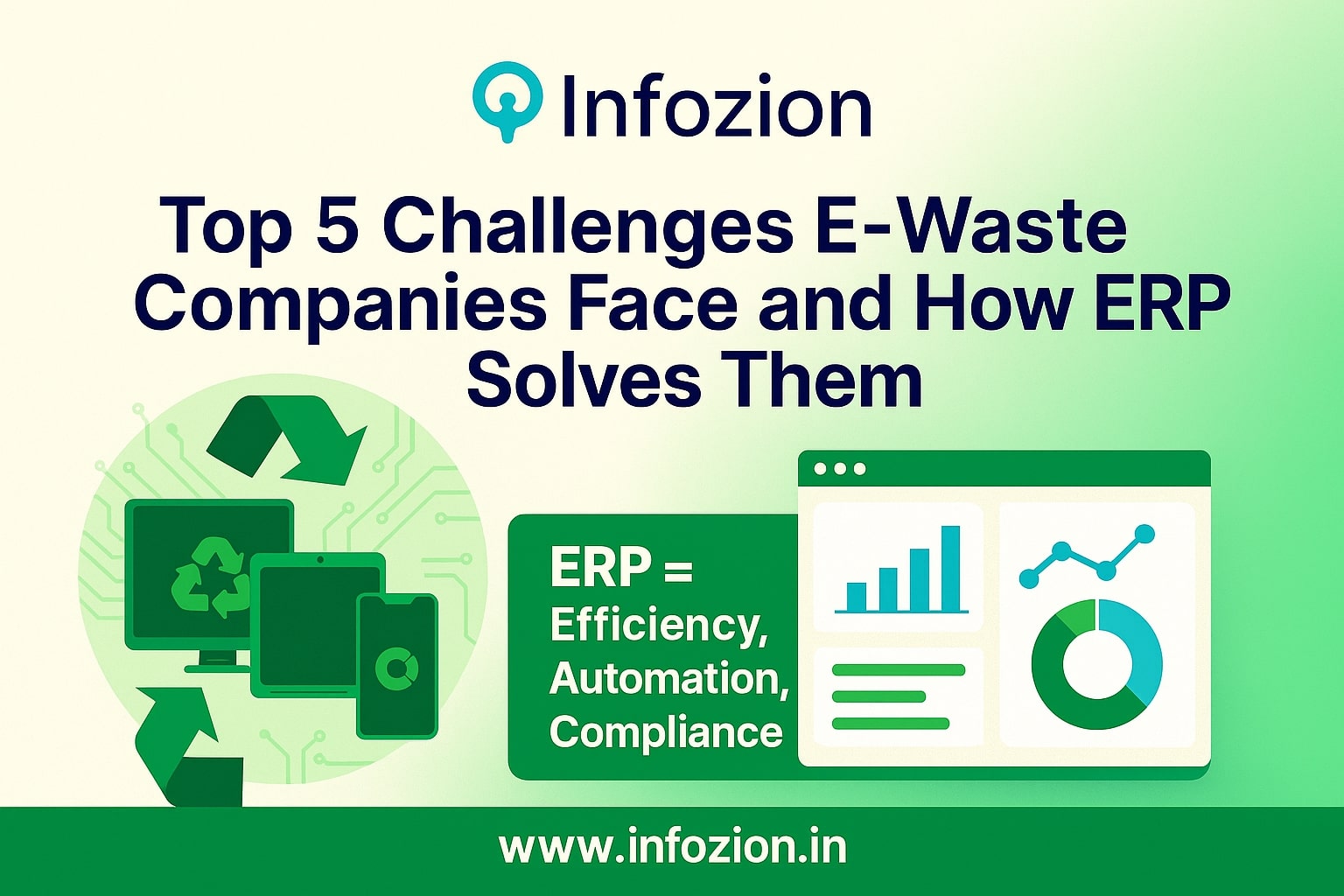Top 5 Challenges E-Waste Companies Face and How ERP Solves Them

Top 5 Challenges E-Waste Companies Face and How ERP Solves Them
Running an e-waste management business can be rewarding, but it also brings major hurdles. In this article, we’ll explore the Top 5 Challenges E-Waste Companies Face and how ERP software helps solve each one through automation, better tracking, and smarter data management.
E-waste management involves tracking, recycling, compliance, and logistics—all at once. Without the right tools, companies struggle to stay organized and efficient. That’s why many e-waste firms now rely on ERP systems to manage operations more effectively.
Inaccurate Inventory Tracking
In e-waste management, every item counts—from refurbished computers to recyclable metals. When tracking is done manually, mistakes happen easily. You might overcount, undercount, or lose valuable components—and these errors often lead to profit loss and safety risks.
How ERP Fixes It
ERP software brings real-time inventory tracking. Every piece of equipment—from collection to recycling—is logged automatically. You can see exactly what’s in stock, what’s under processing, and what’s ready for dispatch.
ERP dashboards even help predict which materials will increase in demand, allowing smarter planning and reduced waste.
If you’d like to learn how ERP planning works in real business stages, read this complete guide on ERP implementation phases
Delayed Recycling Turnaround
Time is money in the e-waste industry. When materials sit idle in storage, it affects your cash flow and customer satisfaction. Delays happen mainly because of manual sorting, lack of coordination, and unclear scheduling.
How ERP Fixes It
ERP software automates daily workflows. It assigns tasks, monitors progress, and alerts managers when deadlines are missed. You can track which items are waiting for processing and who’s responsible for them—all in real time.
According to industry data, businesses using automation recycle up to 40% faster than those using manual processes
Lack of Logistics Visibility
Pickups, deliveries, and shipments happen every day in e-waste recycling. Without proper visibility, it’s hard to know where vehicles are, how much waste has been collected, or which deliveries are pending.
How ERP Fixes It
Modern ERP systems integrate with logistics tracking tools. You can monitor collection routes, optimize vehicle usage, and track deliveries live. This level of visibility not only improves efficiency but also builds client trust. You’ll always know what’s happening in your business—minute by minute.
Compliance and Documentation Overload
E-waste management involves a lot of paperwork—recycling licenses, compliance reports, and audit trails. Manually managing these documents can lead to stress, errors, or missed deadlines. Even one missing report can cause delays or penalties.
How ERP Fixes It
ERP software keeps all compliance data in one secure place. It automatically generates recycling certificates, stores reports, and sends renewal reminders.
Your business stays organized, compliant, and always audit-ready.
For updated sustainability and waste management trends.
Disconnected Departments and Poor Data Flow
In many e-waste companies, every department—finance, warehouse, logistics, and operations—uses a separate system. This disconnect slows down communication and creates confusion.
How ERP Fixes It
ERP integrates all departments into one system. Everyone—from field staff to finance—works with the same live data. No need for manual updates or long email chains. This connected workflow leads to better coordination, faster decisions, and fewer mistakes.
The Future of E-Waste Management
The e-waste industry is growing quickly. To stay competitive, companies must work smarter—not harder. ERP software isn’t just a management tool; it’s a complete solution that improves inventory tracking, workflow automation, compliance management, and team coordination.
By adopting ERP, e-waste companies can reduce costs, boost productivity, and build a sustainable, data-driven future.
Final Thoughts
E-waste businesses face daily challenges—from inventory issues to compliance overload. But with ERP systems, everything becomes simpler and faster. Automation replaces manual work, real-time data replaces guesswork, and transparency replaces confusion.
In simple words, ERP transforms waste management into smart management. And that’s exactly what every e-waste company needs to thrive in the future.





